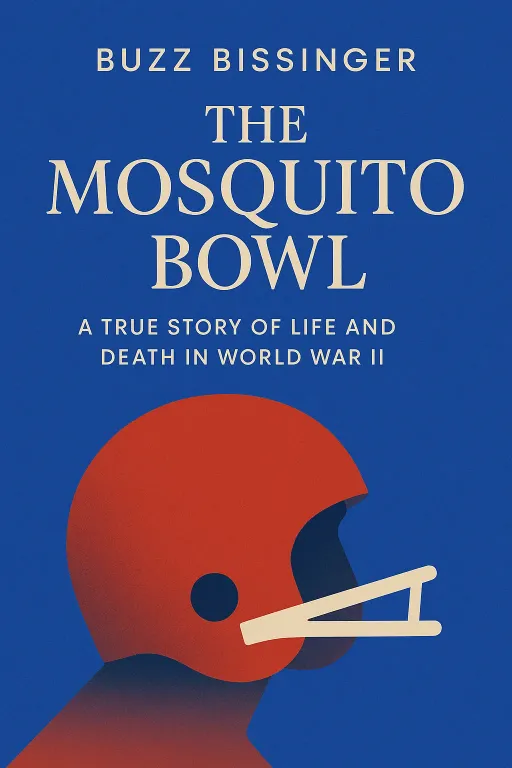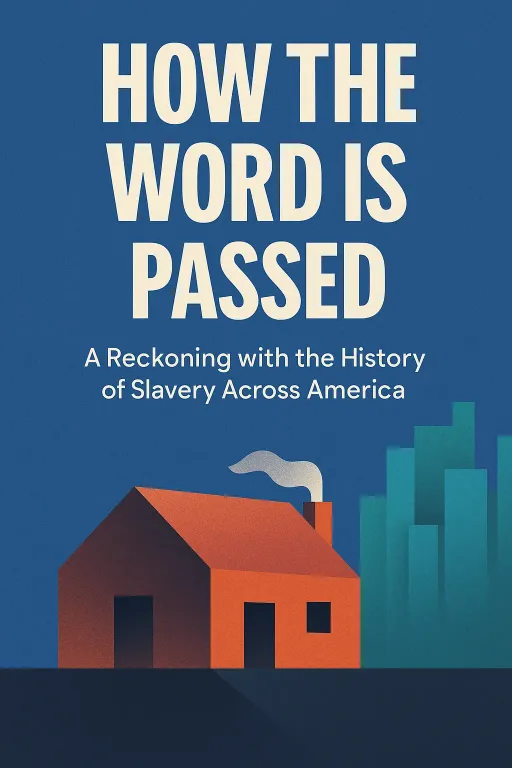
The Mosquito Bowl
10 minA True Story of Life and Death in World War II
Introduction
Narrator: On Christmas Eve of 1944, on the Pacific island of Guadalcanal, an unusual event took place. Thousands of US Marines gathered not for a briefing or a drill, but for a football game. The field was a makeshift patch of dirt, pebbles, and coral shards carved from the parade grounds. The players, many of them former college football stars, wore cutoff dungarees and stenciled T-shirts. They called it the "Mosquito Bowl," a brief, violent, and joyous escape from the crushing boredom and anxiety of waiting for war. Yet, this single game would become a haunting symbol of a generation's sacrifice. Within six months, of the sixty-five men who played, more than a dozen would be dead and twenty more wounded, casualties of one of the bloodiest battles of World War II. This is the story told in Buzz Bissinger’s The Mosquito Bowl: A True Story of Life and Death in World War II, a book that chronicles the lives of these young men, the fleeting glory of their game, and the brutal reality that followed.
A Generation of Promise on the Brink of War
Key Insight 1
Narrator: Before they were Marines, the men of the Mosquito Bowl were the embodiment of American promise. The book introduces figures who represented the best of their generation, young men with seemingly limitless futures. One such individual was John McLaughry of Brown University. In 1940, McLaughry was a star in every sense—a football captain, class president, and a talented artist. He was a man of action and intellect, with opportunities ranging from graduate school to an executive training program to a contract with the New York Giants.
Yet, his world, and the world of his peers, was overshadowed by the escalating conflict in Europe. In 1940, America was staunchly isolationist, scarred by the memory of World War I. A Gallup Poll showed that 79 percent of Americans wanted to stay out of the war, a sentiment even stronger on college campuses. These young men, like David Schreiner, an All-American from the University of Wisconsin, and Tony Butkovich, a powerhouse running back from a Croatian immigrant family in Illinois, were not destined for war; they were destined for careers, families, and quiet lives. They were the sons of coaches, coal miners, and farmers, each on a unique path toward a bright future that the looming global conflict threatened to erase.
The Psychological Crucible of Guadalcanal
Key Insight 2
Narrator: The attack on Pearl Harbor shattered America's isolationism and thrust these young men into uniform. By 1944, many of them found themselves on Guadalcanal, an island that had already seen horrific fighting. But for the newly formed 6th Marine Division, it was a place of waiting. The heat, humidity, and monotony created a psychological pressure cooker. Bissinger describes a pervasive sense of dread mixed with a desperate desire for action. Marines, he writes, "didn’t like to wait; it was better to know you were going to die than play it over and over in your head."
This waiting game took a profound toll. Veterans developed the "thousand-yard stare," a vacant look that signaled the deep trauma of combat. There was an unwritten "rule of three," a fatalistic belief that if a soldier had survived two campaigns, his luck would run out on the third. In this environment of anxiety and boredom, old rivalries and boasts about college football prowess began to surface among the men of the 29th and 4th Regiments. The idea for a football game was born not just from a love of the sport, but from a desperate need for a distraction—a way to feel normal, to feel alive, before being sent into the inferno.
The Mosquito Bowl: A Fleeting Moment of Brotherhood
Key Insight 3
Narrator: The Mosquito Bowl, played on Christmas Eve 1944, was more than just a game; it was a powerful act of defiance against the dehumanizing forces of war. On their makeshift field, the men of the 29th and 4th Regiments played with a ferocity that mirrored the stakes of their real lives. The game was a "semi-tackle street fight," broadcast on the local Mosquito Network radio and followed by sailors on destroyers at sea. For a few hours, these soldiers were not just anonymous cogs in the war machine; they were athletes, heroes, and brothers, reconnected to the lives they had left behind.
The game represented, as Bissinger notes, the purest values of sport: "pure brotherhood without a guaranteed contract, sacrifice of self, the ability to rise above pain, the refusal to quit." These were the very values the military believed football instilled, making it the ideal training for combat. The Mosquito Bowl was a brief, brilliant moment where the men could forget the impending doom and simply be young men again, competing for pride and glory. It was a final, poignant reminder of their humanity before they were shipped off to face the ultimate test on the island of Okinawa.
The Brutal Harvest of Okinawa
Key Insight 4
Narrator: The respite was tragically short-lived. The 6th Marine Division was sent to Okinawa, the final major battle of the Pacific War. What they encountered was a charnel house. The Japanese forces were deeply entrenched, fighting a war of attrition from a complex network of caves and tunnels. The battle, which lasted eighty-two days, was one of the deadliest in history, with an average of three thousand people dying every day.
The promise and vitality displayed in the Mosquito Bowl were extinguished in the mud and chaos of Okinawa. The book unflinchingly recounts the fates of its players. Tony Butkovich, the powerful running back, was killed by a sniper. George Murphy, the Notre Dame captain, died charging a heavily fortified position known as Sugar Loaf Hill. His friend, Charles Behan, "crazy for revenge," was killed just days later. In total, the Mosquito Bowl players suffered a 54 percent casualty rate. The game, once a symbol of life, became a tragic roster of the dead and wounded, illustrating the indiscriminate brutality of war, which consumes the best and brightest without a second thought.
The Enduring Legacy of Sacrifice and Remembrance
Key Insight 5
Narrator: In the aftermath of the war, the stories of these men began to fade. The Mosquito Bowl is an act of recovery, a mission to ensure their sacrifices are not forgotten. Bissinger explores the profound and lasting grief of the families left behind. Dave Schreiner's parents endowed a scholarship in his name, but his father died just a few years later, seemingly from a broken heart. Frank Bauman, whose brother Bob was killed, became a successful football coach but was unable to speak of his brother's death for decades, the pain a wound that never healed. His daughter recalled, "It was almost like if we rip this open, I’ll bleed out."
The book grapples with the concept of the "Greatest Generation," acknowledging the era's flaws while celebrating the extraordinary actions of ordinary men who rose to an unprecedented challenge. The legacy of the Mosquito Bowl is not one of victory or defeat on a football field, but one of profound human cost. It is a reminder that history's grand narratives are built on individual lives filled with potential, love, and dreams—lives that were willingly sacrificed.
Conclusion
Narrator: The single most important takeaway from The Mosquito Bowl is the stark, heartbreaking contrast between the vibrant potential of youth and the indiscriminate horror of war. The book masterfully uses the story of a single football game to frame the immense scale of this loss. These were not just soldiers; they were sons, fiancés, and community heroes on the cusp of their lives, whose futures were stolen by the brutal calculus of combat.
Ultimately, Buzz Bissinger’s work challenges us to look beyond the statistics and monuments of war. It asks us to remember the individuals—the football stars, the artists, the scholars—who answered the call to serve. What does it mean to honor their sacrifice? It means remembering not just how they died, but how they lived, and recognizing the immense, unfulfilled promise that was lost on the battlefields of Okinawa.









